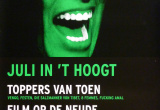Festivals in the Netherlands
The oldest film festival in the world dates back to 1932, when the first Mostra Internazionale d'Arte Cinematografica was organised in Venice, Italy. Venice was the only major film festival up until WWII. This began to change in 1946, when the first Festival du film de Cannes was held in Cannes in southern France. Other cities would follow soon thereafter: in 1946, Karlovy Vary in the Czech Republic began to host a large film festival, in 1947 the first Edinburgh International Film Festival was held in Great Britain and in Germany, Berlin’s Internationale Filmfestspiele Berlin (also knowns as the Berlinale) started in 1951.
Venice and Cannes soon developed into the most prestigious festivals in the world. Their award presentations are among the highlights of the film industry’s annual events; only the Oscars awards are considered more significant.
Filmweek Arnhem
Not wanting to be left behind, the Dutch organised their own film event in 1955: the Filmweek Arnhem. The Nederlandse Bioscoopbond was the initiator of this event which became the national showcase for Dutch film. There were national and international premieres during the Filmweek, and important directors and film stars were among the invitees. The festival had its heyday in the 1950s and 1960s; thereafter it status waned. The Filmweek Arnhem – which had been held biannually – was organised for the last time in 1983.
Cinemanifestatie
In the meantime, a new festival had started up in Utrecht: the Cinemanifestatie. Huub Bals was the organiser who lead the first edition in 1966. In contrast to Filmweek Arnhem – which primarily focused on established names – the emphasis in Utrecht was on young, independent filmmakers. They were following the example of the Semaine de la Critique, part of the Cannes film festival which was started in 1962 to show the work of unknown, talented directors. Just as in Arnhem, the Cinemanifestatie was organised every other year; the last edition took place in 1978.
Film International - International Film Festival Rotterdam
Meanwhile, Rotterdam was also developing a plan. In the summer of 1972, it organised its first festival: Film International. The festival drew a few thousand visitors, but there was far less interest in it than in Utrecht’s Cinemanifestatie. Rotterdam was ambitious, however. In November of that same year, the Rotterdam Kunststichting wrote an official memorandum to the city’s mayor and aldermen. The memorandum advised that the festival should be organised in January in the futures. It also proposed that a distribution division should be started simultaneously to distribute films that didn’t have a distributor after they were shown at Dutch festivals. These films would be shown in the ‘Film International circuit’ – filmhouses that were started up all over the Netherlands. The first of these was filmhouse ‘t Hoogt in Utrecht, followed by other cities including Amsterdam, Rotterdam, Groningen and Arnhem. The distribution division of Film International, called International Art Film, fused in the 1990s with the Filmmuseum’s distribution branch and became NFM/IAF.
In January 1973, the second Rotterdam festival took place with Huub Bals as its director. Under his guidance, the festival would develop into one of the leading film festivals in Europe, where the programme would emphasise independent film. Film International showed the first films by Rainer Werner Fassbinder, Philippe Garrel and Daniël Schmidt and followed the careers of Werner Schroeter, Otar Iosseliani and Raúl Ruiz. Dutch filmmakers who presented their films in Rotterdam included Frans Zwartjes, Frans van de Staak and Kees Hin. Mainstream Dutch feature films were not usually included in the festival’s selection. It wasn’t until after Bals’ death in the 1990s, when the event started to grow into a large and popular festival, that more Dutch films were included in the programme. Currently, the International Film Festival Rotterdam (IFFR) – as it’s been known since the 1990s – draws between 300,000 and 400,000 visitors.
Since 1996, IFFR has been handing out the Tiger Awards -- its own film awards for young filmmakers with first or second feature films. In 2002, Eugenie Jansen became the first (and thus far the only) Dutch filmmaker to win a Tiger Award for her film Tussenland. In addition to the film programme, IFFR has also organised CineMart, a large international co-production market for many years.
Nederlandse Filmdagen - Nederlands Film Festival
Since 1981, the Netherlands has also had an annual festival dedicated solely to Dutch film – the Nederlands Filmdagen (now known as the Nederlands Film Festival) – which is held in Utrecht. Each year, the festival offers an overview of Dutch film production: features, documentaries, animation, experimental film and films made by students. Retrospectives of actors, directors and a variety of subjects are also presented.
During the festival’s closing ceremony, the most important Dutch film award is presented: the Golden Calf.
In addition to the above-mentioned festivals, there are also a still some other Dutch festivals and film events. The best known of these are the international student film festival called Cinestud, Film at the Sea in Vlissingen, and IDFA – the International Documentary Festival Amsterdam – which is one of the leading documentary film festivals in the world.
more information
If you are looking for more material from our collection, please contact Film Sales:
sales@eyefilm.nl
phone +31 (0)20 5891 426

